【新课标】Unit 1 Where did you go on vacation? Section A Grammar Focus-3c 课件(共32张PPT)
文档属性
| 名称 | 【新课标】Unit 1 Where did you go on vacation? Section A Grammar Focus-3c 课件(共32张PPT) |  | |
| 格式 | zip | ||
| 文件大小 | 1.9MB | ||
| 资源类型 | 试卷 | ||
| 版本资源 | 人教新目标(Go for it)版 | ||
| 科目 | 英语 | ||
| 更新时间 | 2022-08-21 13:26:19 | ||
图片预览

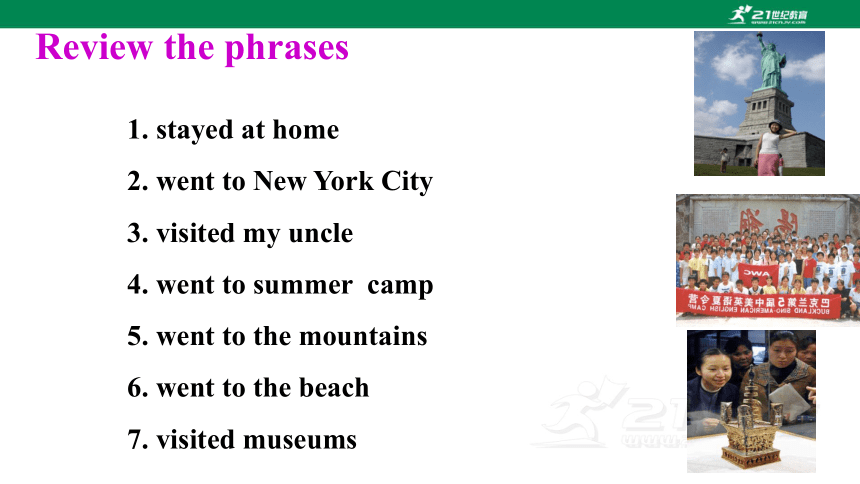

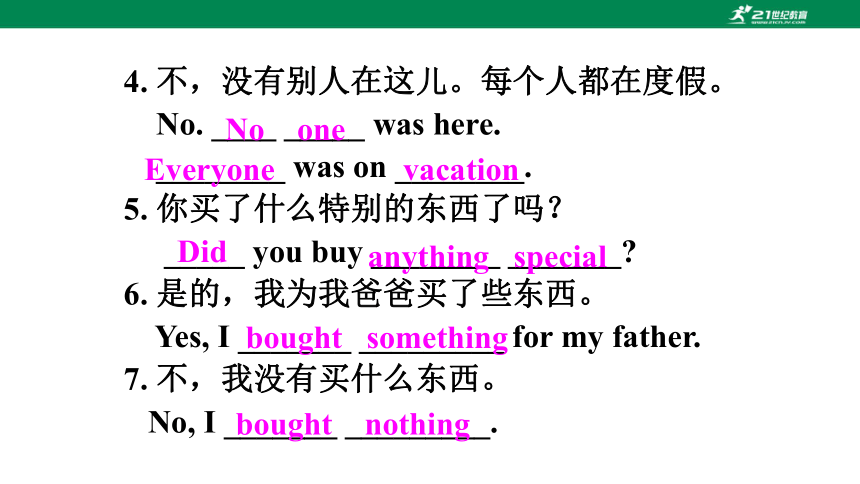
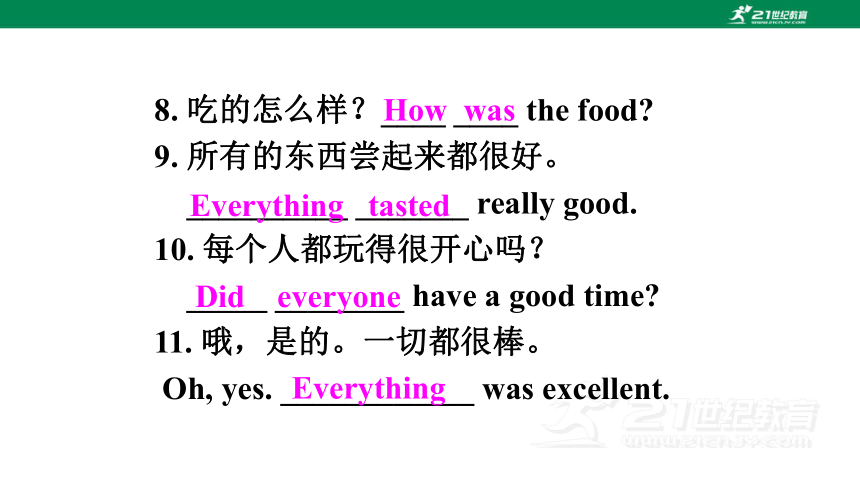
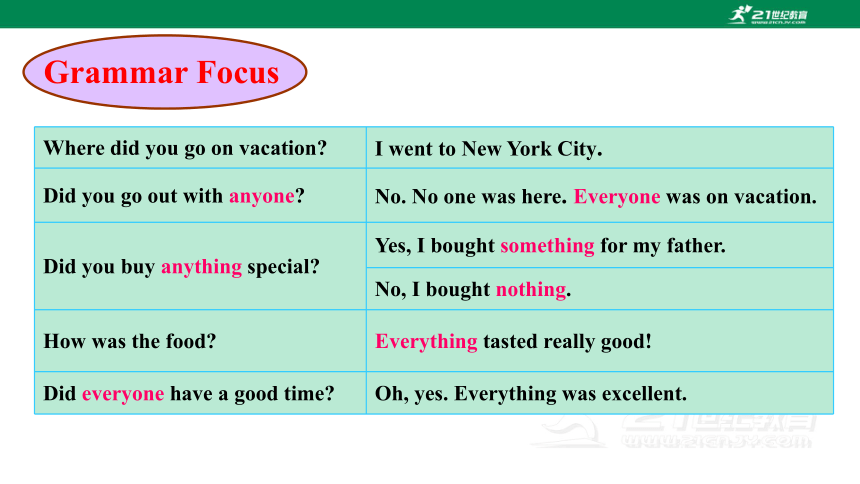
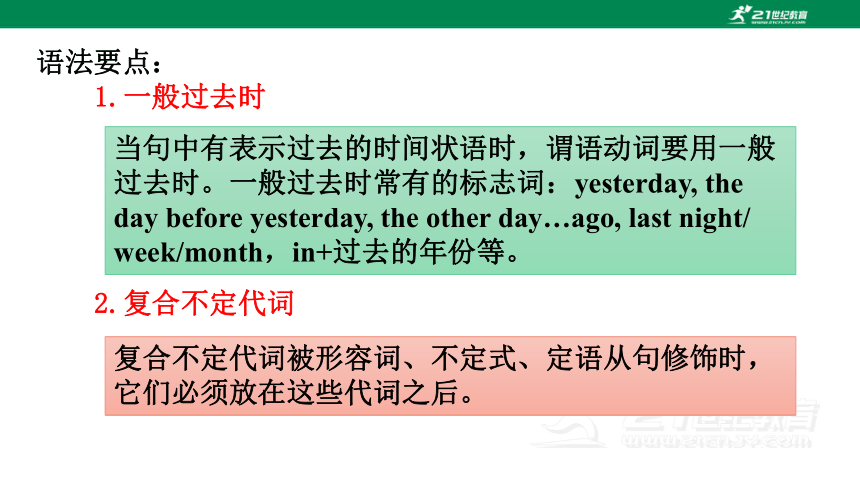
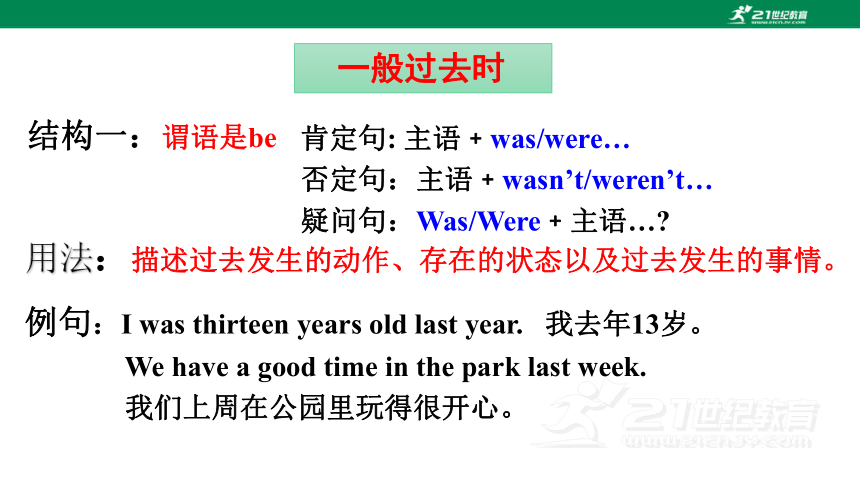

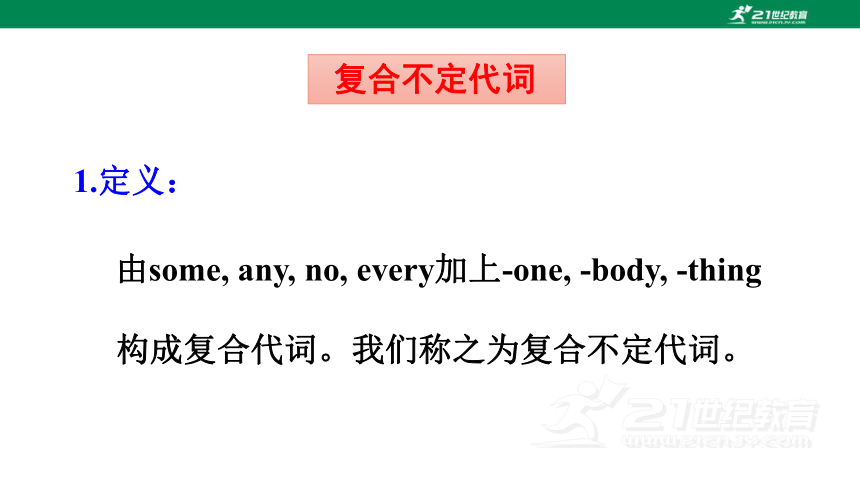
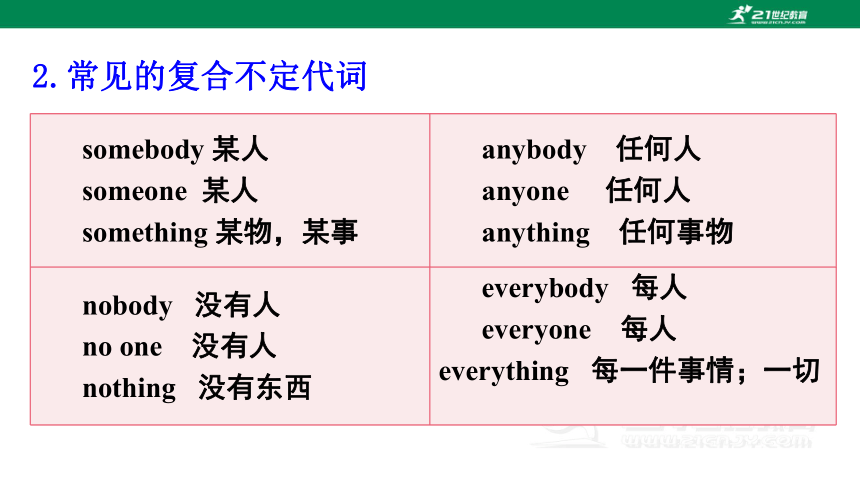
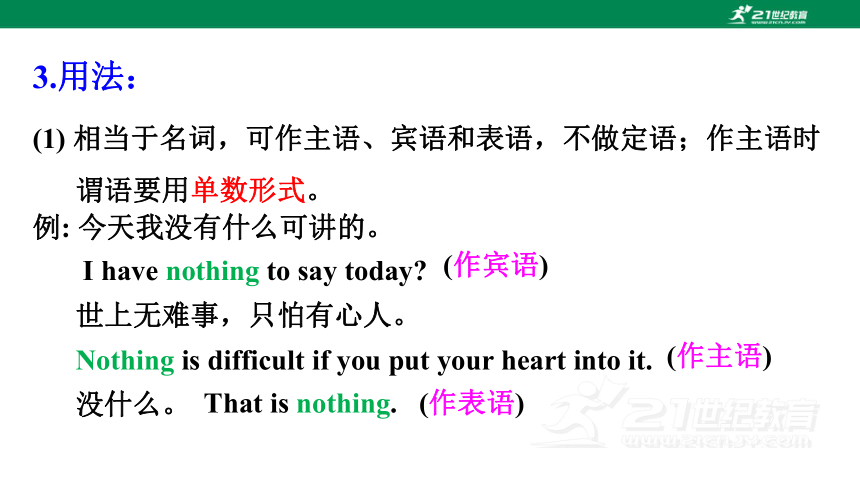
文档简介
(共32张PPT)
Unit 1 Where did you go on vacation
Review the phrases
1. stayed at home
2. went to New York City
3. visited my uncle
4. went to summer camp
5. went to the mountains
6. went to the beach
7. visited museums
1. 你去了什么地方去度假?
______ _____ you go on ________
2. 我去了纽约市。
I _____ ____ New York City.
3. 你和别的什么人一起去的吗?
______ ______ go out with _______
vacation
Where did
went to
Did you
anyone
根据课本内容,完成下列句子。
4. 不,没有别人在这儿。每个人都在度假。
No. ____ _____ was here.
________ was on ________.
5. 你买了什么特别的东西了吗?
_____ you buy ________ _______
6. 是的,我为我爸爸买了些东西。
Yes, I _______ _________ for my father.
7. 不,我没有买什么东西。
No, I _______ _________.
No one
Everyone
vacation
anything special
Did
bought something
bought nothing
8. 吃的怎么样?____ ____ the food
9. 所有的东西尝起来都很好。
__________ _______ really good.
10. 每个人都玩得很开心吗?
_____ ________ have a good time
11. 哦,是的。一切都很棒。
Oh, yes. ____________ was excellent.
How was
Everything tasted
Did everyone
Everything
Grammar Focus
Where did you go on vacation I went to New York City.
Did you go out with anyone No. No one was here. Everyone was on vacation.
Did you buy anything special Yes, I bought something for my father.
No, I bought nothing.
How was the food Everything tasted really good!
Did everyone have a good time Oh, yes. Everything was excellent.
语法要点:
1.一般过去时
2.复合不定代词
当句中有表示过去的时间状语时,谓语动词要用一般过去时。一般过去时常有的标志词:yesterday, the day before yesterday, the other day…ago, last night/ week/month,in+过去的年份等。
复合不定代词被形容词、不定式、定语从句修饰时,它们必须放在这些代词之后。
一般过去时
结构一:谓语是be
用法:描述过去发生的动作、存在的状态以及过去发生的事情。
例句:I was thirteen years old last year. 我去年13岁。
We have a good time in the park last week.
我们上周在公园里玩得很开心。
肯定句: 主语﹢was/were…
否定句:主语﹢wasn’t/weren’t…
疑问句:Was/Were﹢主语…
结构二:谓语是行为动词
用法:描述过去一段时间内经常或习惯性的动作;常与频率
副词连用。
例句:I always walked to school in the past.
过去我总是步行上学。
肯定句:主语﹢动词的过去式….
否定句:主语﹢didn’t ﹢动词原形.
疑问句: Did﹢主语﹢动词原形
复合不定代词
1.定义:
由some, any, no, every加上-one, -body, -thing构成复合代词。我们称之为复合不定代词。
somebody 某人
someone 某人
something 某物,某事 anybody 任何人
anyone 任何人
anything 任何事物
nobody 没有人
no one 没有人
nothing 没有东西 everybody 每人
everyone 每人
everything 每一件事情;一切
2.常见的复合不定代词
3.用法:
(1) 相当于名词,可作主语、宾语和表语,不做定语;作主语时谓语要用单数形式。
例: 今天我没有什么可讲的。
I have nothing to say today
世上无难事,只怕有心人。
Nothing is difficult if you put your heart into it.
没什么。
(作宾语)
(作主语)
That is nothing.
(作表语)
(2) somebody/someone/something一般用于肯定句,
而anybody/anyone/anything一般用于否定句、疑问句或条
件状语从句。
例:某人正在唱歌。
我们现在不能作出任何决定。
你要是需要什么,请给我打电话。
Someone /Somebody is singing a song.
We can’t decide anything now.
If you want anything, please call me.
(3)复合不定代词被形容词、不定式、定语从句修饰时,它们
必须放在这些代词之后。
例:There is nothing wrong with the machine.
这台机器有问题。
Do you want anything to drink.
你想喝点什么吗?
If there is anything I can do for you , tell me.
如果有什么我能帮你的,请告诉我。
中考对接
(1)(湖北武汉中考)—That’s a nice mobile phone.
— It is . My aunt ____ it for my last birthday.
A. buy B. will buy
C. have bought D. bought
(2)(江苏南京中考)I was looking for a birthday gift for
my mother, but I couldn’t find ____suitable.
A. something B. anything
C. nothing D. everything
3a
Fill in the blanks with the words in the box and practice the conversation.
anyone, something, anything, everything , nothing
Linda: Did you do ________ fun on your vacation, Alice
Alice: yes, I did. I went to Sanya.
Linda: How did you like it
Alice: Well, it was my first time there. So __________ was
really interesting.
anything
everything
Linda: Did you go with__________
Alice: Yes, I did. I went with my sister.
Linda: Did you go shopping
Alice: Of course! I bought _________ for my parents, but
__________ for myself.
Linda: Why didn’t you buy__________ for yourself
Alice: I didn’t really see _________ I liked.
anyone
something
anything
nothing
anything
anyone, something, anything, everything , nothing
3b
Fill in the blanks in the e-mail message with the words in the box.
anything, everything, nothing, everyone, no one
Dear Bill,
How was your vacation Did you do _________ interesting Did ________ in the family go with you I went to a friend’s farm in the countryside with my family. ___________ was great.
anything
everyone
Everything
We fed some hens and saw some baby pigs. They were so cute! The only problem was that there was _______ much to do in the evening but read. Still _________ seemed to be bored. Bye for now!
Mark
anything, everything, nothing, everyone, no one
nothing
no one
Language points
1.Everything tasted really good !
所有的东西尝起来真的很好吃!
taste在此为系动词,意为“尝起来”,其后接形容词。
e.g. The food tastes really great.
食物尝起来棒极了。
The milk tasted terrible.
牛奶尝起来很糟糕。
2.Did everyone have a good time 大家玩得开心吗
have a good time = enjoy oneself
= have fun 玩得开心 (+ doing)
eg: We had a good time visiting the Great Wall.
= We ______ ________ ______ the the Great Wall.
= We ____ _____ _______the Great Wall.
enjoyed ourselves visiting
had fun visiting
3.How did you like it
句型How ... sb. like ... 与What ... sb. think of ... 同义,意为“某人觉得……怎么样?”。如:
How do you like the TV show
= ____________________ the TV show
你觉得这个电视节目怎么样?
What do you think of
Language points
4. Still no one seemed to be bored.
seem意为“好像;似乎;看来”,其主要用法如下:
◆seem+ (to be) + adj. 如:
The movie _______________________.
这部电影似乎很有趣。
◆seem to do sth. 如:
The boy _____________ nothing about it. 这个男孩似乎对它一无所知。
seems (to be) interesting
seems to know
据汉语意思完成英语句子。
1) 这儿的衣服似乎很贵。
The clothes here ___________ very expensive.
2) 他们似乎周六要去上海。
They seem _______ to Shanghai on Saturday.
3) 好像今天她要开车去上班。
_____________ she’ll drive to work today.
seem to be
to go
It seems that
Language points
5.The only problem was that there was nothing much to do in the evening but read.
唯一的问题是晚上除了读书没什么事可做。
nothing much to do意为“没什么事可做”。
a. I have________ _____ __ ____this afternoon.
今天下午我没什么特殊的事可做。
b. There is _______ ______ __ ____,so I go to bed early.
没什么事可做,因此我就早早睡觉了。
nothing much to do
nothing much to do
拓展:nothing…but…意为“除……之外什么也没有;只有”。but后可接名词或动词原形。
a. I had nothing but a cup of tea this morning.
我今天早上只喝了杯茶。
b. I had nothing to do but watch TV.
我无事可做,只有看电视。
2.Still no one seemed to be bored.
(即使这样)仍然没有人看起来无聊。
1)seem不及物动词或系动词,“好像;似乎;看来”。
eg: Everything seems easy. 一切似乎很容易。
The cake seems very delicious.
那块蛋糕看上去很美味。
3c
Ask your group questions about their last vacation. Then
tell the class your results.
Did you… Everyone Someone No one
eat anything at a restaurant
read anything interesting
visit anyone in your family
buy anything
keep a diary
单项选择。
1. Do you have _____ to do this evening
A. important something B. anything important
C. something important
2. _____ is watching TV. Let’s turn it off .
A . Somebody B. Anybody C. Nobody
3.—What ____ the noise, Bill —Sorry, I broke my glass.
A. is B. was C. are D. were
4. Would you like ___ I can get it for you .
A. something else B. anything else
C. everything else
5.I agree with most of what you said, but I don't agree with
______.
A. everything B. anything
C. something D. nothing
1. Lucy did her homework yesterday evening. (改为否定句)
Lucy ______ __ _____ ____________ yesterday evening.
2. Jim went to the beach last Sunday. (对画线部分提问)
_____ _____ Jim ______ last Sunday
3. They played basketball yesterday. (对画线部分提问)
________ _______ they play basketball
4. The students had great fun in the park. (改为同义句)
The students ____ __ ___________ ______ in the park.
didn’t do her homework
What did do
根据要求改写下列句子。
When did
had a good / great time
背诵Grammar focus部分。
复习复合不定代词及反身代词的用法。
Unit 1 Where did you go on vacation
Review the phrases
1. stayed at home
2. went to New York City
3. visited my uncle
4. went to summer camp
5. went to the mountains
6. went to the beach
7. visited museums
1. 你去了什么地方去度假?
______ _____ you go on ________
2. 我去了纽约市。
I _____ ____ New York City.
3. 你和别的什么人一起去的吗?
______ ______ go out with _______
vacation
Where did
went to
Did you
anyone
根据课本内容,完成下列句子。
4. 不,没有别人在这儿。每个人都在度假。
No. ____ _____ was here.
________ was on ________.
5. 你买了什么特别的东西了吗?
_____ you buy ________ _______
6. 是的,我为我爸爸买了些东西。
Yes, I _______ _________ for my father.
7. 不,我没有买什么东西。
No, I _______ _________.
No one
Everyone
vacation
anything special
Did
bought something
bought nothing
8. 吃的怎么样?____ ____ the food
9. 所有的东西尝起来都很好。
__________ _______ really good.
10. 每个人都玩得很开心吗?
_____ ________ have a good time
11. 哦,是的。一切都很棒。
Oh, yes. ____________ was excellent.
How was
Everything tasted
Did everyone
Everything
Grammar Focus
Where did you go on vacation I went to New York City.
Did you go out with anyone No. No one was here. Everyone was on vacation.
Did you buy anything special Yes, I bought something for my father.
No, I bought nothing.
How was the food Everything tasted really good!
Did everyone have a good time Oh, yes. Everything was excellent.
语法要点:
1.一般过去时
2.复合不定代词
当句中有表示过去的时间状语时,谓语动词要用一般过去时。一般过去时常有的标志词:yesterday, the day before yesterday, the other day…ago, last night/ week/month,in+过去的年份等。
复合不定代词被形容词、不定式、定语从句修饰时,它们必须放在这些代词之后。
一般过去时
结构一:谓语是be
用法:描述过去发生的动作、存在的状态以及过去发生的事情。
例句:I was thirteen years old last year. 我去年13岁。
We have a good time in the park last week.
我们上周在公园里玩得很开心。
肯定句: 主语﹢was/were…
否定句:主语﹢wasn’t/weren’t…
疑问句:Was/Were﹢主语…
结构二:谓语是行为动词
用法:描述过去一段时间内经常或习惯性的动作;常与频率
副词连用。
例句:I always walked to school in the past.
过去我总是步行上学。
肯定句:主语﹢动词的过去式….
否定句:主语﹢didn’t ﹢动词原形.
疑问句: Did﹢主语﹢动词原形
复合不定代词
1.定义:
由some, any, no, every加上-one, -body, -thing构成复合代词。我们称之为复合不定代词。
somebody 某人
someone 某人
something 某物,某事 anybody 任何人
anyone 任何人
anything 任何事物
nobody 没有人
no one 没有人
nothing 没有东西 everybody 每人
everyone 每人
everything 每一件事情;一切
2.常见的复合不定代词
3.用法:
(1) 相当于名词,可作主语、宾语和表语,不做定语;作主语时谓语要用单数形式。
例: 今天我没有什么可讲的。
I have nothing to say today
世上无难事,只怕有心人。
Nothing is difficult if you put your heart into it.
没什么。
(作宾语)
(作主语)
That is nothing.
(作表语)
(2) somebody/someone/something一般用于肯定句,
而anybody/anyone/anything一般用于否定句、疑问句或条
件状语从句。
例:某人正在唱歌。
我们现在不能作出任何决定。
你要是需要什么,请给我打电话。
Someone /Somebody is singing a song.
We can’t decide anything now.
If you want anything, please call me.
(3)复合不定代词被形容词、不定式、定语从句修饰时,它们
必须放在这些代词之后。
例:There is nothing wrong with the machine.
这台机器有问题。
Do you want anything to drink.
你想喝点什么吗?
If there is anything I can do for you , tell me.
如果有什么我能帮你的,请告诉我。
中考对接
(1)(湖北武汉中考)—That’s a nice mobile phone.
— It is . My aunt ____ it for my last birthday.
A. buy B. will buy
C. have bought D. bought
(2)(江苏南京中考)I was looking for a birthday gift for
my mother, but I couldn’t find ____suitable.
A. something B. anything
C. nothing D. everything
3a
Fill in the blanks with the words in the box and practice the conversation.
anyone, something, anything, everything , nothing
Linda: Did you do ________ fun on your vacation, Alice
Alice: yes, I did. I went to Sanya.
Linda: How did you like it
Alice: Well, it was my first time there. So __________ was
really interesting.
anything
everything
Linda: Did you go with__________
Alice: Yes, I did. I went with my sister.
Linda: Did you go shopping
Alice: Of course! I bought _________ for my parents, but
__________ for myself.
Linda: Why didn’t you buy__________ for yourself
Alice: I didn’t really see _________ I liked.
anyone
something
anything
nothing
anything
anyone, something, anything, everything , nothing
3b
Fill in the blanks in the e-mail message with the words in the box.
anything, everything, nothing, everyone, no one
Dear Bill,
How was your vacation Did you do _________ interesting Did ________ in the family go with you I went to a friend’s farm in the countryside with my family. ___________ was great.
anything
everyone
Everything
We fed some hens and saw some baby pigs. They were so cute! The only problem was that there was _______ much to do in the evening but read. Still _________ seemed to be bored. Bye for now!
Mark
anything, everything, nothing, everyone, no one
nothing
no one
Language points
1.Everything tasted really good !
所有的东西尝起来真的很好吃!
taste在此为系动词,意为“尝起来”,其后接形容词。
e.g. The food tastes really great.
食物尝起来棒极了。
The milk tasted terrible.
牛奶尝起来很糟糕。
2.Did everyone have a good time 大家玩得开心吗
have a good time = enjoy oneself
= have fun 玩得开心 (+ doing)
eg: We had a good time visiting the Great Wall.
= We ______ ________ ______ the the Great Wall.
= We ____ _____ _______the Great Wall.
enjoyed ourselves visiting
had fun visiting
3.How did you like it
句型How ... sb. like ... 与What ... sb. think of ... 同义,意为“某人觉得……怎么样?”。如:
How do you like the TV show
= ____________________ the TV show
你觉得这个电视节目怎么样?
What do you think of
Language points
4. Still no one seemed to be bored.
seem意为“好像;似乎;看来”,其主要用法如下:
◆seem+ (to be) + adj. 如:
The movie _______________________.
这部电影似乎很有趣。
◆seem to do sth. 如:
The boy _____________ nothing about it. 这个男孩似乎对它一无所知。
seems (to be) interesting
seems to know
据汉语意思完成英语句子。
1) 这儿的衣服似乎很贵。
The clothes here ___________ very expensive.
2) 他们似乎周六要去上海。
They seem _______ to Shanghai on Saturday.
3) 好像今天她要开车去上班。
_____________ she’ll drive to work today.
seem to be
to go
It seems that
Language points
5.The only problem was that there was nothing much to do in the evening but read.
唯一的问题是晚上除了读书没什么事可做。
nothing much to do意为“没什么事可做”。
a. I have________ _____ __ ____this afternoon.
今天下午我没什么特殊的事可做。
b. There is _______ ______ __ ____,so I go to bed early.
没什么事可做,因此我就早早睡觉了。
nothing much to do
nothing much to do
拓展:nothing…but…意为“除……之外什么也没有;只有”。but后可接名词或动词原形。
a. I had nothing but a cup of tea this morning.
我今天早上只喝了杯茶。
b. I had nothing to do but watch TV.
我无事可做,只有看电视。
2.Still no one seemed to be bored.
(即使这样)仍然没有人看起来无聊。
1)seem不及物动词或系动词,“好像;似乎;看来”。
eg: Everything seems easy. 一切似乎很容易。
The cake seems very delicious.
那块蛋糕看上去很美味。
3c
Ask your group questions about their last vacation. Then
tell the class your results.
Did you… Everyone Someone No one
eat anything at a restaurant
read anything interesting
visit anyone in your family
buy anything
keep a diary
单项选择。
1. Do you have _____ to do this evening
A. important something B. anything important
C. something important
2. _____ is watching TV. Let’s turn it off .
A . Somebody B. Anybody C. Nobody
3.—What ____ the noise, Bill —Sorry, I broke my glass.
A. is B. was C. are D. were
4. Would you like ___ I can get it for you .
A. something else B. anything else
C. everything else
5.I agree with most of what you said, but I don't agree with
______.
A. everything B. anything
C. something D. nothing
1. Lucy did her homework yesterday evening. (改为否定句)
Lucy ______ __ _____ ____________ yesterday evening.
2. Jim went to the beach last Sunday. (对画线部分提问)
_____ _____ Jim ______ last Sunday
3. They played basketball yesterday. (对画线部分提问)
________ _______ they play basketball
4. The students had great fun in the park. (改为同义句)
The students ____ __ ___________ ______ in the park.
didn’t do her homework
What did do
根据要求改写下列句子。
When did
had a good / great time
背诵Grammar focus部分。
复习复合不定代词及反身代词的用法。
同课章节目录
- Unit 1 Where did you go on vacation?
- Section A
- Section B
- Unit 2 How often do you exercise?
- Section A
- Section B
- Unit 3 I'm more outgoing than my sister.
- Section A
- Section B
- Unit 4 What's the best movie theater?
- Section A
- Section B
- Unit 5 Do you want to watch a game show?
- Section A
- Section B
- Unit 6 I'm going to study computer science.
- Section A
- Section B
- Unit 7 Will people have robots?
- Section A
- Section B
- Unit 8 How do you make a banana milk shake?
- Section A
- Section B
- Unit 9 Can you come to my party?
- Section A
- Section B
- Unit 10 If you go to the party, you'll have a grea
- Section A
- Section B
